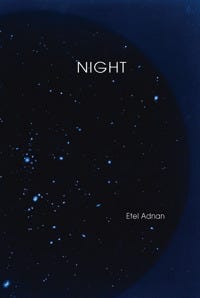
How does the poet situate her body in relation to the world? The Western literary canon is full of examples of white male poets who claim a transcendental voice to speak for nature. But projection enacts a solipsistic violence, insofar as it erases voices of alterity and further centers white men’s experiences as if they were universal.
Enter Night, a stunning new lyric collection from Etel Adnan, one of our finest living poets. A Lebanese-American lesbian poet, Adnan posits a different, queer relationship with nature, turning to traces like shadows and memories to explore the embodied epistemologies of nature, mediated in human terms. Rather than presuming to speak for nature in a universal voice, Adnan demonstrates a radical receptivity to the universe’s voices. “By the way, we’re just a window on the world,” she writes. Windows are porous membranes: we look outward and discover more about ourselves, oscillating between reflection and refraction. To rewrite the poet’s subject position as a window is to articulate a task of openness to show us what’s outside — as well as inside, since language is not a one-way window.
Adnan’s receptivity is evident in her fine-tuned attention to detail, at the microscopic and cosmic level alike. Her lens shifts in scale and orientation, defamiliarizing the surroundings we thought we knew and re-introducing us to nature. Adnan casts light in dark interiors/exteriors, finding fullness in apparent voids and excesses within the self as well as in the environment. She asks, “Can one spend time within a flower?” then dares to try — but not by means of trite personification. Instead, she lets loose of borders to blur the line between human and non-human, between the abstract, corporeal, and metaphysical. A few other choice lines:
“My memories form a forest with unstable boundaries.”
“Night is a subtle rain, wetting body and soul.”
“I can hear the night’s pulse. Divine will circulates around its edges.”
“Water brings energy the way memory creates identity.”
The subjectivity of nature becomes a metaphor to re-enter her own subjectivity. For example: “I lived exclusively by my own wits, this is why I am a river.” This becoming is different than the Romantic embodiment I mentioned before–in this metaphor the poet’s self does not speak for a river; instead, the poet understands herself through the empathetic exercise of imagining the river’s subjectivity. If we listen hard enough, Adnan invites us to imagine “non-human memories from where our own surges.”
Adnan’s aphorisms and other dialogic forms, such as her “Conversations with my soul,” veer toward the philosophical. On the opening page, she suggests that “philosophy brings us back to simplicity.” However, her odyssey through the body of night troubles the idea of knowledge authority. Adnan frames philosophy as a series of investigative inquiries (scattered across horizons, seas, literature, and memories) in place of assertive axioms, bringing us ultimately to a point of aporia: a liminal and irresolute space of mystery. We are dizzied, in awe: “Each day is a whole world. / Worlds are pursuing their odyssey.”
“Writing on a window onto the world”: A review of Etel Adnan’s Night was originally published in DrunkenBoat on Medium, where people are continuing the conversation by highlighting and responding to this story.
